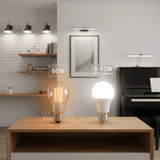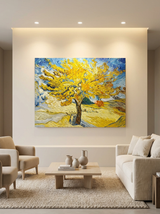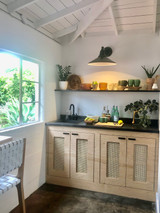Color Temperature Explained: A Complete Guide to Warm vs. Cool Light
Learn what color temperature is and how it affects the mood, function, and appearance of lighting. Discover the Kelvin scale, real-world examples, and tips for choosing the right light color for each room.
What Is Color Temperature?
Color temperature refers to the visual warmth or coolness of light and is measured in Kelvin (K). The scale typically ranges from 2000K (very warm) to 6500K (cool daylight).
- Lower Kelvin = Warm, amber/yellow tones
- Higher Kelvin = Cool, bluish-white tones
Understanding the Kelvin Scale
Below is a breakdown of typical color temperatures, their appearance, and recommended usage.
2000K–2700K: Very Warm White
- Look: Amber glow (like candlelight)
- Best for: Bedrooms, restaurants, rustic interiors
- Effect: Very cozy and intimate
2700K–3000K: Warm White
- Look: Soft yellow-white (like an incandescent bulb)
- Best for: Living rooms, dining rooms
- Effect: Comfortable and welcoming
3500K–4000K: Neutral White
- Look: Clean, neutral white
- Best for: Kitchens, bathrooms, galleries
- Effect: Balanced and functional without feeling cold
4000K–5000K: Cool White
- Look: Bright white with bluish undertone
- Best for: Home offices, garages, task lighting
- Effect: Energizing and modern
5000K–6500K: Daylight
- Look: Crisp, blue-white (like clear noon sky)
- Best for: Studios, commercial spaces, detail work
- Effect: High visibility and clarity
How Color Temperature Affects Mood & Color
| Temperature | Psychological Mood | Visual Effect |
| 2700K | Calm, cozy | Warms colors, softens shadows |
| 3500K | Neutral, functional | True-to-life color rendering |
| 5000K | Alert, stimulating | Boosts contrast, makes whites brighter |
Best Color Temperatures by Room
Each room serves a different purpose, and your lighting should support that function.
| Room | Ideal Temperature | Why |
|---|---|---|
| Bedroom | 2200K–2700K | Promotes relaxation and sleep |
| Living Room | 2700K–3000K | Cozy and inviting |
| Kitchen | 3000K–4000K | Functional and vibrant |
| Bathroom | 3500K–4500K | Bright enough for grooming |
| Office/Studio | 4000K–5000K | Enhances focus and energy |
| Garage/Workshop | 5000K–6500K | Maximizes visibility |
| Art Display | 3000K–4000K | Accurate color without distortion |
Bonus Tip: Choosing Color Temperature for Artwork
Lighting can make or break your presentation of art:
- Warm light (2700K–3000K): Enhances traditional and earthy tones
- Neutral white (3500K–4000K): True-to-life color for most art styles
- Cool light (5000K–6500K): Ideal for black & white photography or modern pieces
Avoid lighting that's too warm or cool—it can distort colors and the intended mood of the artwork.
Final Thoughts
Choosing the right color temperature isn’t just about aesthetics—it influences how you feel, function, and interact with your space.
- Use warm lighting (like 2700K) to create cozy, relaxing environments
- Opt for cooler tones in work areas to boost focus and clarity
- Choose neutral light for spaces where accurate color and balance are key
Cocoweb lighting, with its signature 2700K LED fixtures, is ideal for adding warmth and charm to living rooms, bedrooms, reading nooks, and hospitality settings. Designed for both performance and timeless style, Cocoweb lights help you shape your space’s mood while maintaining energy efficiency and visual comfort.
By understanding the Kelvin scale—and choosing the right fixtures like those from Cocoweb—you can elevate your home’s atmosphere without changing a single piece of furniture.
Recent Posts
-
Understanding Lumens vs. Watts: What Your LED Light Really Means
Choosing a new light bulb used to be simple. You would walk into a store, look for a 60-watt bulb, a …29th Jan 2026 -
How to Light Large Paintings Without Overpowering Your Room
You’ve found the perfect large-scale artwork. It’s bold, it’s beautiful, and it demands attention. B …20th Jan 2026 -
Barn Lights Aren’t Just for Barns: Perfect Indoor Lighting for Small, Functional Spaces
When you think of barn lights, you might picture rustic exteriors, large workshops, or classic farmh …19th Dec 2025




